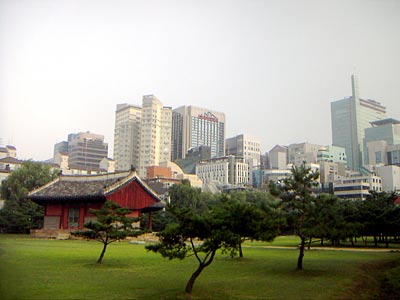
essay by Jasmina Tešanović
photos by Bruce Sterling
Korea: South, not North
When I checked in for my flight to Seoul at the
Belgrade aerodrome,
the desk clerk was bewildered. She had heard of Korea,
she had even
heard of Seoul. But: oh my god, she exclaimed, I do
mix them up so,
the north and south.
When I finally landed in Korea — no visa required
— they had
never heard of Serbia. I had to trigger that magic
word "Yugoslavia,"
so that the Korean computer blinked in nostalgic
approval and allowed
me into the country.
The wild demilitarized zone between the two Koreas
is a major
tourist attraction: so I was told. Not for me it
isn't, I said: I've
seen too many of those borders, from Berlin, to
Serbia, to the rest
of the world.

The American Cold War propaganda is surely bad
enough there,
but in North Korea they are segregated so drastically
from the rest
of the planet that everything they say sounds shallow.
South Korea
wants to reach out to the North, to build cultural
bridges,
communications,
diplomacy, finance, the usual, yet the North seems
entirely
uninterested. What must the people think? All this
fanaticism without
even the luxury of an ethnic
division.
Until 15 years ago, in South Korea, women would
get a driver's licences whenever their husbands got
one.
Women never had to take any driver's education
courses, as it was
presumed that women would never drive. Then women took
the wheel and
finally the law changed.
A huge, rapid transition for women, says a guest
at the LIFT
event in Seoul: I am an optimist. He is a foreign
expert living as
an optimist in Korea, he hopes his daughter will marry
a Korean and
that two Koreas will re-unite.
People are lively, hard working, and, I
notice, strangely
silent: this huge Asian metropolis of over 20 million
is quieter than
a small town in Italy. The airport is as clean and
solemn as a
hospital ward. The service in malls, restaurants,
hotels is like
something from a science fiction movie: everything is
possible, just
let me know from which planet you come.
The shopping malls are crammed with the usual
Western luxury
brands, and hordes of Korean women shopping: when the
women meet for
lunch, for once, they let themselves talk loudly.
The city never sleeps, but the workers are
allowed to sleep at
work if they have no urgent duties or customers to
pester. Empty
shops are manned by slumbering clerks. Unemployment
is next to
zero: everybody is doing his/her small task in the
mighty chain of
the big civil utilities, the Korean "chaebol" cartels.
Love hotels are rented by the hour, ten dollars
for a bed in a
tall shiny building without architectural glamour.
The skyscrapers
are as anonymous as the city's black and white cabs.
Nameless
buildings bear numbers in nameless streets which are
also numbered…
Beauty shops, beauty clinics, medical anti-aging
clinics, in a
city where obesity seems almost unknown if not
expressly forbidden.
What do they eat? The famous Korean dog-meat,
live octopus
hastily chopped into violently wriggling shreds, a
putrid pink fish
which reeks of ammonia. This pink fermented skate
fish, stinking and
crunchy with cartilage — the natives of the Korean
deep south long
for this fish when they are in Europe, surrounded by
stinking
European cheeses. And hot Asian peppers, even big
Korean garlic
cloves that are searingly hot, as hot as hot can get;
they might not
cure cancer, but one bite of those obliterates
culture-shock.
The farewell event was a champagne party,
sponsored by the
French, aimed at Koreans. Hundreds of beautiful
Korean girls dancing
to Brooklyn rap music, dressed in their silky local
fashions and
stiletto high heels, men in dark or silver business
suits with long,
pointed, narrow black shoes… One woman at the party
told me how
hard life is for a feminist in this very chauvinist
male society. She
wants her career: society wants her to have a baby.
Perhaps that was
why, after swilling much free champagne, she suddenly
jumped into the
discotheque's swimming pool, fully dressed. Her
boyfriend jumped in
after her and they lived there happily ever after.
Seoul's statue of the Maitreya, the huge Buddha of
the Future,
was built only 11 years ago. In downtown Seoul this
Buddha Who Is to
Come oversees the bland skyscrapers with his tolerant,
easy worldly
wisdom. In his towering concrete meditations, perhaps
he will open
the door to futurity for the one Korean people, so
sadly divided by
that military business they call the Past.
– – – – – – – – – –
Previous essays by Jasmina Tešanović on BoingBoing:
– "I heard they are making a movie on her life."
– Serbia and the Flames
– Return to Srebenica
– Sagmeister in Belgrade
– Jasmina Tešanović: What About the Russians?
– Milan Martic sentenced in Hague
– Mothers of Mass Graves
– Hope for Serbia
– Stelarc in Ritopek
– Sarajevo Mon Amour
– MBOs
– Killing Journalists
– Jasmina Tešanović: Where Did Our History Go?
– Serbia Not Guilty of Genocide
– Carnival of Ruritania
– "Good Morning, Fascist Serbia!"
– Faking Bombings
– Dispatch from Amsterdam
– Where are your Americans now?
– Anna Politkovskaya Silenced
– Slaughter in the Monastery
– Mermaid's Trail
– A Burial in Srebenica
– Report from a concert by a Serbian war criminal
– To Hague, to Hague
– Preachers and Fascists, Out of My Panties
–
Scorpions Trial, April 13
– The Muslim Women
– Belgrade: New Normality
– Serbia: An Underworld Journey
– Scorpions Trial, Day Three: March 15, 2006
– Scorpions Trial, Day Two: March 14, 2006
– Scorpions Trial, Day One: March 13, 2006
– The Long Goodbye
– Milosevic Arrives in Belgrade
– Slobodan Milosevic Died
– Milosevic Funeral





